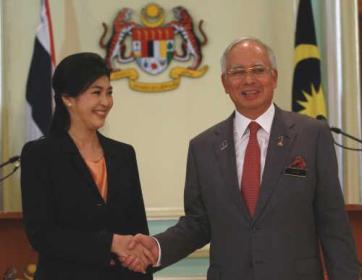Is Malaysia really helping Thailand douse the southern fire?
There are indications that Malaysia’s role in "facilitating" the peace talk process between the Thai government and the Barisan Revolusi Nasional (BRN) separatist organization was meant for domestic political gains.

Although the official role of Malaysia is just a "facilitator", it seems that the country has been acting as if it were the “mediator” of the two parties in the conflict. This was evident in the way that Malaysian Prime Minister Najib Razak stole the limelight from Prime Minister Yingluck Shinawatra at the historic signing of the General Consensus on Peace Dialogue Process agreement on March 28 in Kuala Lumpur between Lt-Gen Paradorn- Pattanatabut, secretary-general of the National Security Council, representing the Thai government and Hassan Taib on behalf of the BRN.
Mr Razak broke the news about the role played by fugitive former prime minister Thaksin Shinawatra in making possible the peace talk. But his disclosure of Thaksin’s involvement amounted to the dropping of a political bombshell which could derail the peace process because of the strong resistance against the fugitive in Thailand.
The historic event was played up by state-owned and mainstream media the following day whereas the alternative media gave little interest to the event. No Thai media representatives were present at the event and the source of the news about this historic event was from foreign news agencies.
It is an open secret that Prime Minister Najib is facing increasing challenges at home with a general election looming on the horizon and a security threat in Sabah state of Borneo from hundreds of Muslim rebels from the Philippines who invaded the state to claim territorial sovereignty.
Malaysia’s role in facilitating the peace initiative in southern Thailand is widely believed to help boost Mr Najib’s popularity. It is a win-win situation for Malaysia and Thaksin, too, will stand to gain if the initiative results to improvement of the situation. But what the Thai people and Thailand will gain?
A source close to the NSC chief said noted that this was the first time that Kuala Lumpur had clearly announced that it would not provide sanctuary to escaping separatists from Thailand, would not support separatism and violence in southern Thailand. This announcement amounts to open support of Thailand in the handling of insurgency problem.
But critics wonder why the support now? As a good neighbor, why didn’t Malaysia help out long time ago especially on the problem of providing shelter for the separatists from Thailand.
Lt-Gen Paradorn said that in international politics, political gains are a common consideration and hence Malaysia will stand to gain something for its involvement. But what really matters is Thailand’s gains, he added.
There is a question regarding the BRN representatives who were involved in the signing of the peace process agreement. That is: Were they forced to sign the agreement because they have been living in exile in Malaysia?
Security sources said that previous Thai governments had held informal peace talks with the same group of separatists and, once held talks in the Philippines. So why not the Philippines chosen to facilitate or broker the peace talk process between the Thai government and the BRN instead of Malaysia which shares a common border with Thailand and provides shelter to the separatists?
Can or should we place our hope on Malaysia? Can we be assured that the Malaysian government can effectively police the border and stop the separatists from seeking refuge in Malaysia?
Undoubtedly, peace talk process is welcoming and should help in finding a solution to the protracted conflict. But we should also be smart enough and adhere to our national interests as top priority.
